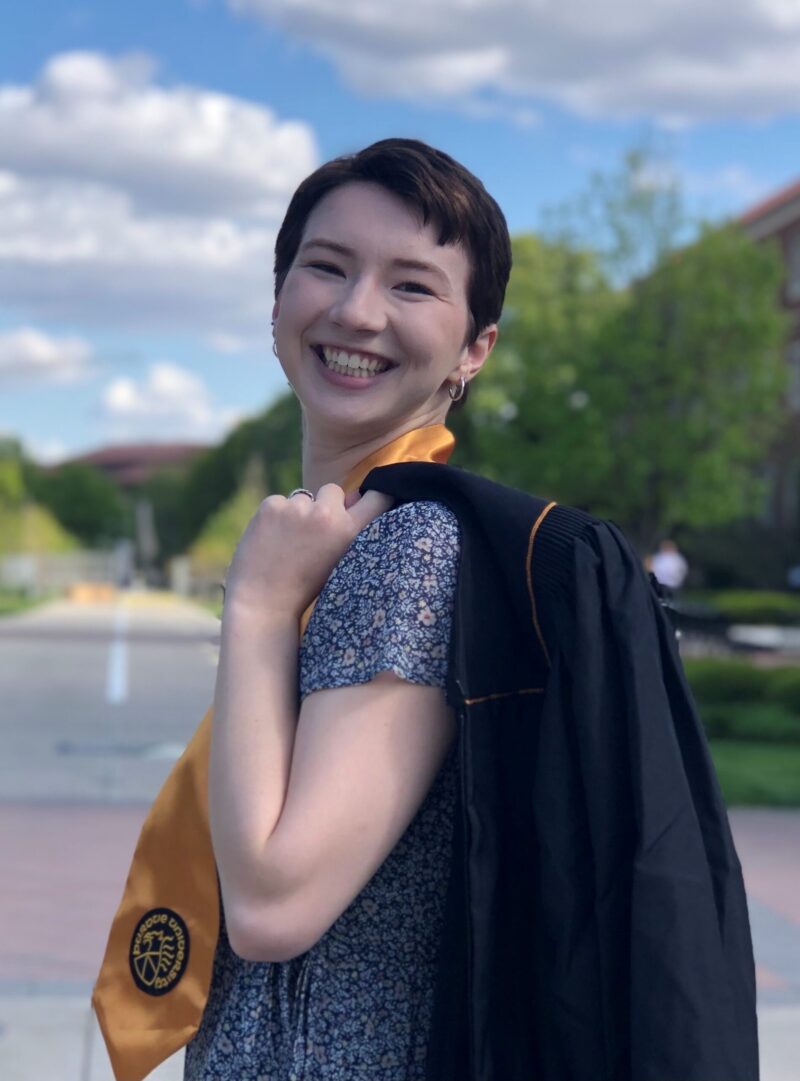Toxicology education prepares 2021 Purdue graduate for career as deputy coroner
Written By: Rebecca Hoffa, rhoffa@purdue.edu

Meredith RobbinsPhoto provided
Purdue University College of Health and Human Sciences (HHS) alumna Meredith Robbins was considering becoming a doctor until she took a toxicology class taught by Jonathan Shannahan. Shannahan, an assistant professor in the School of Health Sciences, introduced her to forensic toxicology through “The Poisoner’s Handbook” by Deborah Blum, and Robbins found herself hooked on learning more about an entirely different area of medicine.
“It was very interesting to me,” Robbins said. “It’s a really wonderful mix between this puzzle that you have to solve and also this standardization of science, which I really enjoy. You kind of get the best of both worlds.”
Although she embarked as a Purdue graduate in May 2021 with a job as a medical scribe in an outpatient medical office, she quickly knew it wasn’t the right fit and began further exploring the toxicology field. A few months later, she began her career as deputy coroner — finding in that job the perfect blend of the toxicology she loved and the human health aspect of medicine.
With its odd hours and moments of intensity, Robbins noted that becoming a deputy coroner might not be the first thing that comes to mind for someone with a background in health sciences. However, for her, the uncertainty of what each day will bring is part of the thrill of the job.
As a deputy coroner, Robbins’ main goal is to determine the cause and manner of death for deceased individuals, from the moment the coroner’s office receives notification of death until disposition, or final settlement, of the body. This often involves requesting accident reports, using information from toxicology or autopsy studies, and interviewing the family of the deceased.
“I really enjoy the combination of the hard science that I get to experience with the pathology and toxicology — I really enjoy that it is very methodical at points — but I also love the fact that I get to go on scene and talk to people, and I get to kind of be in that,” Robbins said. “I still get to talk to families. I can be that person who can talk them through the steps — I can be that comfort if they need it. I think a lot of times people think police are really the ones doing that, and at points they definitely do, but really, at least in our county, it’s the coroner’s office.”
Having earned her degree in environmental health sciences — now occupational and environmental health sciences — Robbins’ background in studying human health and medicine made the transition to her career in the coroner’s office much easier. While Robbins has observed that very few deputy coroners come in with both a medicine and forensic science background, she commented that having the health sciences knowledge set her up for success in interpreting medical calls and reports, which is a significant component of the job, and allowed her to focus on better understanding the forensic science side of things as she went.
“I think the range of things that are taught within the environmental health sciences degree — I think it was important to have that exposure,” Robbins said. “If I hadn’t been exposed to toxicology, I don’t know what I would have been doing today. I probably would have continued to pursue medicine — not to say that’s a bad option; I just don’t know if it would have been for me.”
However, extending beyond her coursework, Robbins was also heavily involved in undergraduate research with Ellen Wells, associate professor of health sciences, which shaped her process and approach as a deputy coroner, giving her the skills needed to closely examine information and use data to support a conclusion.
“My research has been probably one of the biggest influencers for me,” Robbins said. “The level of detail that I need for this job is very high. There’s things that if you miss them, it’s really going to determine how the investigation goes. Dr. Wells has really made a huge difference in how I approach things at work and how I go about my investigation.”
Working as a deputy coroner helped Robbins push her boundaries and get out of her comfort zone. While a degree in health sciences allows students to go in a variety of directions with their career, Robbins advised that it’s worth exploring beyond traditional fields to help students find their true passion.
“There’s a lot more opportunities for this type of career and this type of degree than maybe something else that you would end up choosing,” Robbins said. “That was what really drew me in — the fact that I knew that I could use this degree as very much a stepping stone for a lot of different opportunities.”
Discover more from News | College of Health and Human Sciences
Subscribe to get the latest posts sent to your email.